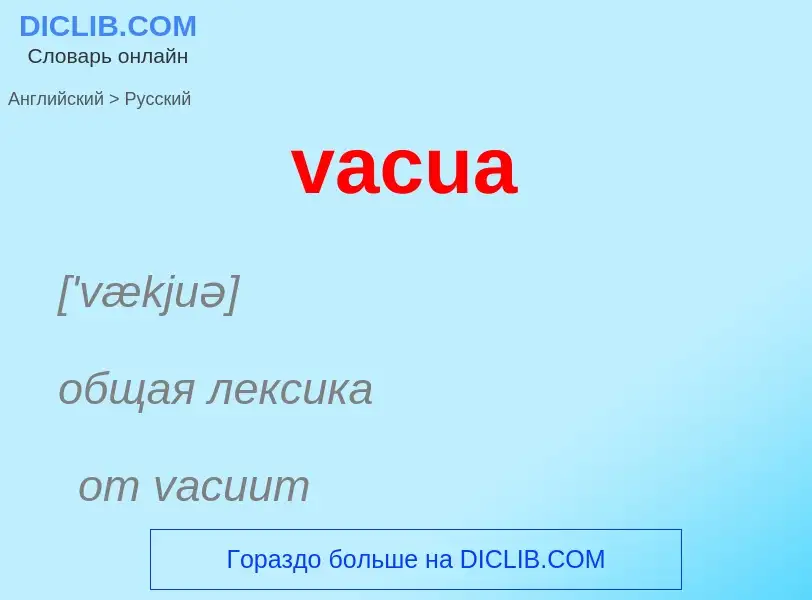Перевод и анализ слов искусственным интеллектом ChatGPT
На этой странице Вы можете получить подробный анализ слова или словосочетания, произведенный с помощью лучшей на сегодняшний день технологии искусственного интеллекта:
- как употребляется слово
- частота употребления
- используется оно чаще в устной или письменной речи
- варианты перевода слова
- примеры употребления (несколько фраз с переводом)
- этимология
vacua - перевод на русский
['vækjuə]
общая лексика
от vacuum
['vækju(ə)m]
общая лексика
безвоздушный
вакуум
вакуум-закаточный
вакуум-месильный
вакуум-разливочный
вакуум-укупорочный
вакуум-упаковочный
вакуум-эжекторный
вакуумно-осажденный
пустота
пустотность
разрежение
строительное дело
разряжение
существительное
['væku(ə)m]
общая лексика
пробел
пустота
вакуумный
физика
вакуум
разрежённое пространство
безвоздушное пространство
вакуум, безвоздушное пространство
разговорное выражение
вакуумный прибор (пылесос и др.)
собирательное выражение
пониженное давление (по сравнению с атмосферным)
пылесос
глагол
общая лексика
пользоваться вакуумным прибором
разговорное выражение
чистить пылесосом
пылесосить
Википедия

A vacuum is a space devoid of matter. The word is derived from the Latin adjective vacuus for "vacant" or "void". An approximation to such vacuum is a region with a gaseous pressure much less than atmospheric pressure. Physicists often discuss ideal test results that would occur in a perfect vacuum, which they sometimes simply call "vacuum" or free space, and use the term partial vacuum to refer to an actual imperfect vacuum as one might have in a laboratory or in space. In engineering and applied physics on the other hand, vacuum refers to any space in which the pressure is considerably lower than atmospheric pressure. The Latin term in vacuo is used to describe an object that is surrounded by a vacuum.
The quality of a partial vacuum refers to how closely it approaches a perfect vacuum. Other things equal, lower gas pressure means higher-quality vacuum. For example, a typical vacuum cleaner produces enough suction to reduce air pressure by around 20%. But higher-quality vacuums are possible. Ultra-high vacuum chambers, common in chemistry, physics, and engineering, operate below one trillionth (10−12) of atmospheric pressure (100 nPa), and can reach around 100 particles/cm3. Outer space is an even higher-quality vacuum, with the equivalent of just a few hydrogen atoms per cubic meter on average in intergalactic space.
Vacuum has been a frequent topic of philosophical debate since ancient Greek times, but was not studied empirically until the 17th century. Evangelista Torricelli produced the first laboratory vacuum in 1643, and other experimental techniques were developed as a result of his theories of atmospheric pressure. A Torricellian vacuum is created by filling with mercury a tall glass container closed at one end, and then inverting it in a bowl to contain the mercury (see below).
Vacuum became a valuable industrial tool in the 20th century with the introduction of incandescent light bulbs and vacuum tubes, and a wide array of vacuum technologies has since become available. The development of human spaceflight has raised interest in the impact of vacuum on human health, and on life forms in general.


![This painting, ''[[An Experiment on a Bird in the Air Pump]]'' by [[Joseph Wright of Derby]], 1768, depicts an experiment performed by [[Robert Boyle]] in 1660. This painting, ''[[An Experiment on a Bird in the Air Pump]]'' by [[Joseph Wright of Derby]], 1768, depicts an experiment performed by [[Robert Boyle]] in 1660.](https://commons.wikimedia.org/wiki/Special:FilePath/An Experiment on a Bird in an Air Pump by Joseph Wright of Derby, 1768.jpg?width=200)
![mercury]] [[barometer]] produced one of the first sustained vacuums in a laboratory. mercury]] [[barometer]] produced one of the first sustained vacuums in a laboratory.](https://commons.wikimedia.org/wiki/Special:FilePath/Baro 0.png?width=200)
![The [[Crookes tube]], used to discover and study [[cathode ray]]s, was an evolution of the [[Geissler tube]]. The [[Crookes tube]], used to discover and study [[cathode ray]]s, was an evolution of the [[Geissler tube]].](https://commons.wikimedia.org/wiki/Special:FilePath/Crookes tube two views.jpg?width=200)
![A cutaway view of a [[turbomolecular pump]], a momentum transfer pump used to achieve high vacuum A cutaway view of a [[turbomolecular pump]], a momentum transfer pump used to achieve high vacuum](https://commons.wikimedia.org/wiki/Special:FilePath/Cut through turbomolecular pump.jpg?width=200)
![Light bulbs]] contain a partial vacuum, usually backfilled with [[argon]], which protects the [[tungsten]] filament Light bulbs]] contain a partial vacuum, usually backfilled with [[argon]], which protects the [[tungsten]] filament](https://commons.wikimedia.org/wiki/Special:FilePath/Gluehlampe 01 KMJ.jpg?width=200)



